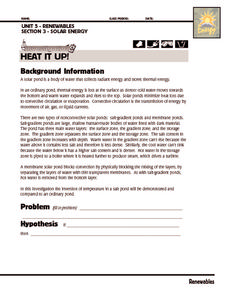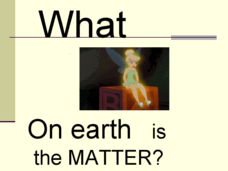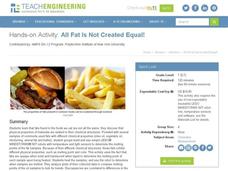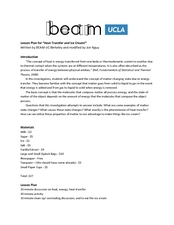Texas State Energy Conservation Office
Investigation: Heat it Up!
This demonstration of solar ponds can be used in an earth, environmental, or physical science setting. Lab groups set up a solar pond and model how it is able, due to a salt concentration gradient, to maintain heat for future use.
Institute of Electrical and Electronics Engineers
Solar Structures
It's time to soak up the sun! Youngsters read about active and passive solar heating systems, then they collaborate to create a miniature solar-heated building. Provide a variety of materials for them to incorporate and watch their...
Science Matters
Hot Wire S’mores
The proof is in the marshmallows. Believing that electric energy can transform into heat energy can be abstract, but a hands-on lesson plan gives pupils a concrete example. Young scientists cut marshmallows with copper wires before and...
Curated OER
What on Earth is Matter?
A somewhat strangely formatted slide show that contains multiple examples of matter types. The classification and state explanations given would be useful as practice of substance identification and the heating curve may prove to be...
Curated OER
Methods of Heat Transfer
Eighth graders discuss the forms of heat transfer that relate to the human body. Discussion revolves around the ability of different designs of hats to change the rate of heat transfer to and from the body. Students then experiment...
Curated OER
Using Heat
The 6 slides give a few examples of ways that we use heat and heating systems. There is a diagram of circulation in a stove and forced air system as well as other examples of heat movers. Great for an introduction.
University of Minnesota
Homeostasis of Thermoregulation
Whether you're battling the flu or trying to warm up on a chilly day, your body's ability to react to temperature change is fascinating! Anatomy scholars discover the fantastic feedback loops that control body temperature in a rigorous...
Teach Engineering
All Fats Are Not Created Equal
Apply robotics to connect physical properties to chemical properties. Future engineers use robots to determine the melting points of various fats and oils. The robots can do this by measuring the translucency of the fats as they heat up.
Center for Learning in Action
Water – Changing States (Part 2)
Here is part two of a two-part instructional activity in which scholars investigate the changing states of water—liquid, solid, and gas—and how energy from heat changes its molecules. With grand conversation, two demonstrations, and one...
Curated OER
Heat Loss and Gain in Physical Changes and Chemical Reactions
Students measure the heat of physical and chemical changes in reactions. In this chemistry lesson students determine at what extent changes emit or absorb heat.
Curated OER
Energy/Light/Heat/Sound
Fourth graders study the properties of heat in this series of lessons. They discuss sources of heat and experiment to determine its properties. They identify insulators and conductors by measuring temperatures, and graphing their data....
Curated OER
More on Temperature and Solubility
Learners discover how temperature effects the solubility of solutes by experimenting with a range of temperatures. They develop skills for observing, inferring, measuring, comparing and contrasting.
Curated OER
Colors of Stars
Students observe the colors found in the flame of a burning candle and examine the basic concepts of matter and energy. Students apply this information to the color's of starts and the temperature of the stars photosphere. Students...
Curated OER
Unit 0 Review - Measurement Lab Equipment
Review questions like these can be used in your biology, chemistry, physics, or earth science classes! They assess scientists' understanding of laboratory measurement tools including graduated cylinders, thermometers, and balances. They...
Science Matters
Peanut Energy
How do humans get energy since they aren't mechanical and can't photosynthesize? Learners explore this question by relating potential energy in food to human energy levels. Scholars measure the change in mass and a change in temperature...
Colorado State University
Can Gravity Push Something Up?
How does a hot air balloon fly? An experimental lesson has scholars build a balloon from a garbage bag and monitor the movement of air. As the temperature of the air in the balloon increases, gravity moves the denser cool air down,...
Curated OER
The Captain And Lake Wilmar
Tenth graders examine the ecosystem of Lake Wilmar through three coordinated performance tasks. They first investigate the effects of pH on freshwater animals by comparing the zooplankton counts from three different areas. They then...
Curated OER
Heat And Heat Transfer
Students role play molecules in a container as the container is heated to develop a definition of heat and temperature. They also observe demonstrations of conduction, convection, radiation, and phase transfer. Using these observations...
Curated OER
It's in the Bag!
Eighth graders measure temperature changes and make drawings of the interactions between matter and energy. By measuring the temperature students can conclude if there are changes in levels of energy.
.
National Heart Association
Cold Weather Fitness Guide
Don't sacrifice physical activity every time cold winter weather arrives. From walking or circuit training to warm, healthy recipes and safety reminders, this resource will help encourage learners to prioritize their fitness and stay...
Curated OER
Conductive Heat Transfer Experiments
Learners conduct a variety of experiments to see how heat is transferred using common household objects. The teacher uses the safety plans included in the lesson plan. This is ideal for inexperienced Science teachers.
Curated OER
"Heat Transfer and Ice Cream!"
Students analyze earth science by creating a frozen treat in class. In this heat transfer lesson, students discuss how matter is transformed from solid to liquid and liquid to gas when energy is removed from the equation. Students...
Curated OER
Sand or Rock? Finding Out From 1,000 km
Young scholars observe how measurements are made with different instruments. In this remote sensing activity students investigate the physical state of surfaces including the surfaces of the solar system.
Curated OER
Modeling Hot and Cold Planets
Students, in teams, design and construct models of two planets, one hot and the other cold, using a variety of materials. They attempt to create the models out of substances that will actually show the greatest temperature differences...

























